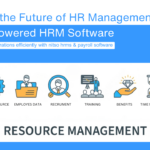Introduction
In today’s digital age, businesses are increasingly turning to cloud business software to streamline operations, enhance collaboration, and improve overall efficiency. Cloud-based solutions have revolutionized the way organizations manage their workflow, offering flexibility, cost savings, and scalability. This article explores the benefits, types, top solutions, and future trends of cloud business software.

What is Cloud Business Software?
Cloud business software refers to applications hosted on remote servers and accessed via the Internet. Unlike traditional on-premise software, cloud-based solutions do not require local installations or extensive hardware investments. Businesses can use these applications on a subscription basis, ensuring they always have access to the latest features and updates.
Benefits of Cloud Business Software
1. Cost-Effective
Cloud software operates on a pay-as-you-go model, eliminating the need for hefty upfront investments in infrastructure. Businesses only pay for the services they use, reducing operational costs.
2. Scalability and Flexibility
Cloud business solutions can scale as a company grows. Whether a business needs to add users, expand storage, or upgrade features, cloud software provides unmatched flexibility.
3. Accessibility and Remote Work
With cloud solutions, employees can access business applications from anywhere with an internet connection. This enhances remote work capabilities and allows for seamless collaboration across different locations.
4. Automatic Updates and Maintenance
Cloud providers manage software updates, security patches, and system maintenance, ensuring that businesses always have access to the latest technology without IT overhead.
5. Data Security and Backup
Leading cloud software providers implement robust security measures, including encryption, multi-factor authentication, and automated backups, to protect sensitive business data.
Types of Cloud Business Software
1. Cloud-Based Customer Relationship Management (CRM)
CRM software helps businesses manage customer interactions, sales pipelines, and marketing campaigns.
- Popular Solutions: Salesforce, HubSpot, Zoho CRM
2. Cloud-Based Project Management Software
These tools help teams organize tasks, track progress, and enhance collaboration.
- Popular Solutions: Asana, Trello, Monday.com, Jira
3. Cloud Accounting and Finance Software
Cloud accounting solutions automate financial tasks such as invoicing, payroll, and expense tracking.
- Popular Solutions: QuickBooks Online, Xero, FreshBooks, Sage Business Cloud
4. Cloud-Based Enterprise Resource Planning (ERP)
ERP software integrates multiple business functions, including finance, HR, supply chain, and inventory management.
- Popular Solutions: NetSuite, SAP Business One, Microsoft Dynamics 365, Odoo
5. Cloud-Based Collaboration and Communication Tools
These platforms enhance team communication and remote collaboration.
- Popular Solutions: Microsoft Teams, Slack, Zoom, Google Workspace
6. Cloud Marketing Automation Software
Marketing software automates email campaigns, social media management, and customer segmentation.
- Popular Solutions: Mailchimp, Marketo, ActiveCampaign, HubSpot Marketing Hub
7. Cloud-Based E-Commerce Platforms
E-commerce solutions provide businesses with tools to sell products and manage online stores.
- Popular Solutions: Shopify, BigCommerce, WooCommerce, Magento
8. Cloud-Based Human Resources (HR) Software
HR software simplifies payroll, benefits management, and employee engagement.
- Popular Solutions: BambooHR, Gusto, Workday, ADP Workforce Now
Top Cloud Business Software Solutions
1. Salesforce – The Leading CRM Software
Salesforce is the world’s most popular cloud-based CRM platform, offering advanced sales, marketing, and customer service features.
2. QuickBooks Online – Cloud Accounting for Small Businesses
QuickBooks Online helps businesses manage finances, track expenses, and generate financial reports effortlessly.
3. Microsoft 365 – Comprehensive Productivity Suite
Microsoft 365 includes cloud-based applications like Word, Excel, Teams, and Outlook, enhancing workplace productivity.
4. NetSuite – Powerful ERP Solution
Oracle NetSuite offers a comprehensive ERP system that integrates financials, inventory, and customer relationship management.
5. Zoom – Cloud-Based Video Conferencing
Zoom has become a go-to cloud communication platform for businesses conducting virtual meetings and webinars.
6. Shopify – Leading E-Commerce Platform
Shopify provides businesses with a cloud-based platform to build and manage online stores, complete with payment processing and marketing tools.
How to Choose the Right Cloud Business Software
1. Assess Business Needs
Identify your company’s pain points and select software that addresses those specific challenges.
2. Consider Integration Capabilities
Ensure that the cloud software can integrate seamlessly with existing business applications.
3. Evaluate Security Measures
Choose a provider with strong security policies, data encryption, and compliance with industry standards.
4. Check User-Friendliness
Opt for software that is easy to use and does not require extensive training.
5. Compare Pricing and Subscription Plans
Select a plan that fits your budget while offering the necessary features and scalability.
Future Trends in Cloud Business Software
1. Artificial Intelligence (AI) and Automation
AI-powered cloud solutions will enhance automation, predictive analytics, and customer service chatbots.
2. Hybrid Cloud Solutions
More businesses will adopt hybrid cloud strategies, combining private and public cloud infrastructures.
3. Increased Focus on Cybersecurity
As cyber threats grow, cloud providers will implement stronger security measures and compliance regulations.
4. Edge Computing Integration
Edge computing will improve cloud computing efficiency by processing data closer to its source.
5. Industry-Specific Cloud Solutions
Tailored cloud software for industries such as healthcare, finance, and manufacturing will continue to emerge.
Conclusion
Cloud business software has transformed how companies operate by offering scalable, cost-effective, and highly efficient solutions. Whether it’s CRM, accounting, HR, or collaboration tools, cloud-based applications help businesses enhance productivity, streamline operations, and stay competitive. As technology continues to evolve, embracing cloud solutions will be crucial for future growth and success.
By implementing the right cloud business software, organizations can optimize their workflows and drive long-term efficiency. Whether you’re a startup or an established enterprise, investing in cloud solutions is a step toward innovation and sustainability in the digital age.









